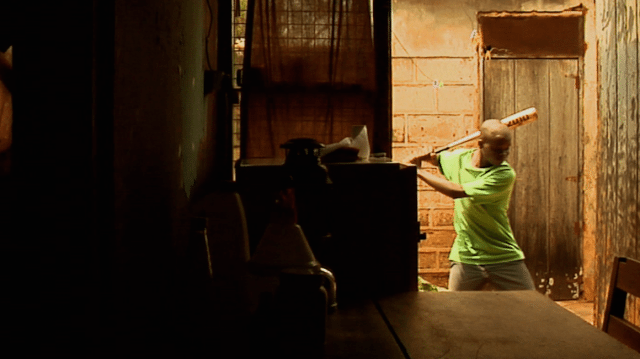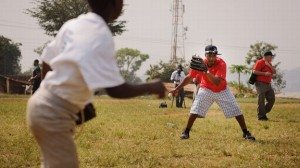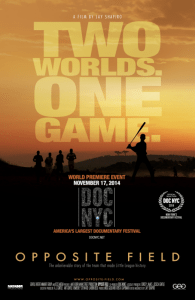
 Documentary filmmaker Jay Shapiro spent several years in Uganda following an inspiring Little League baseball team and making a nonfiction movie about it. The story has been chronicled on NPR, and ABC aired a short version of the film in 2012, but the final version, called Opposite Field, is making its debut at the 2014 edition of DOCNYC. Shapiro chronicles the rise of baseball in one of the world's poorest regions and delivers entertainment that has it all: from cliffhangers to unforgettable characters and thrills. We had the opportunity to talk to director Shapiro about the film's origins and the sociopolitical issues that might represent a challenge for the boys in the film.
Documentary filmmaker Jay Shapiro spent several years in Uganda following an inspiring Little League baseball team and making a nonfiction movie about it. The story has been chronicled on NPR, and ABC aired a short version of the film in 2012, but the final version, called Opposite Field, is making its debut at the 2014 edition of DOCNYC. Shapiro chronicles the rise of baseball in one of the world's poorest regions and delivers entertainment that has it all: from cliffhangers to unforgettable characters and thrills. We had the opportunity to talk to director Shapiro about the film's origins and the sociopolitical issues that might represent a challenge for the boys in the film.
I think Jimmy Rollins pretty much sums up the essence of the film when he says that the last thing he thought would bring him to Uganda would be baseball. At the beginning of the film you pretty much say the same by explaining that once you found out about this project you pretty much just grabbed your camera and left.
Yeah, it’s almost as simple as that. I used to work in Major League Baseball, doing commercials in New York, I grew up loving the game and I spent some time in West Africa, when I was younger in college I made a film there, and I was filming an interview with former baseball great, Dave Winfield, who was talking about going on a baseball trip to Ghana. I’d been to Ghana before and I didn’t remember having seen any baseball there, so after the interview I asked Mr. Winfield about this and he said “oh, you have to meet this guy who’s putting it together”, so I met this guy who then told me I had to meet more people who were doing something similar in other places. One of them was Richard Stanley, who is quite the character. When I first met him I realized he’s a very old school guy, we met at a diner in 2008 and he comes in with a stack of Polaroid pictures and a roll of blueprints under his arm, and he’s showing me what was basically a swamp in the middle of Africa, and I’m thinking how crazy this is, as he tells me he’s going to build a baseball complex, with a pool and everything sounded wild. Since I’d been in Africa I realized it took someone as crazy as him to pull off something like this. I was intrigued. Then he gets to a photograph of some kids playing baseball in Africa and that’s what lit the spark for me, I needed to go see this, because it seemed like they knew what they were doing.
 Can we go further back in time to when you first realized that you liked baseball. Did you see any of yourself as a kid, in these kids you met in Uganda?
Can we go further back in time to when you first realized that you liked baseball. Did you see any of yourself as a kid, in these kids you met in Uganda?
Yeah, once you go there it’s pretty rough, there’s nothing resembling the worst little league field where I played in growing up. I grew up in suburbs in Pennsylvania, in a very cookie-cutter environment, so you can imagine what my baseball experience was like. The game was very important to me and my family, it’s a game that in America you inherit from your parents. I inherited my Philly fandom from my father and it continues to be this really important thing for me, and when you go there you see that all of that is just stripped away, and they just love the game because they’re not inheriting it from anyone, they’re discovering it. It’s this thing they see other people around them playing, so it’s just the game, they’re attracted to the challenge, which is huge there. Even finding a space to play is a challenge, not to mention to find the gloves, the bats...to play it in Uganda you really need to want it. This dedication was inspiring, truly mindblowing. I already mentioned that I think of the game as something related to fathers and sons, and in all honesty, finding positive father figures in Uganda is tough. So that aspect became interesting to me in terms of what the game could mean in this context of manhood and fatherhood. George, the coach in the film becomes a central figure because he is the father figure to this community, in a much more literal way than the coaches in our society.
I have the impression that historically, baseball has become popular in countries that have almost completely different political viewpoints to the United States. Places like Nicaragua, Saudi Arabia and Cuba, or also places with completely different cultural values like Japan. Can you comment on this, was it something you noticed during your research?
America has a very unique standing in the world, I think it’s sort of loved and hated, admired and criticized like nowhere else in the world, and I don’t think that’s an unfair American-centric thing to say. It’s undeniable that baseball is this American game, this export, and so in a place like Uganda where historically there might have been some American tension, but it’s a place you don’t really hear much about in the States, it’s important to say that they certainly hear about us. They know about Hollywood movies and hip-hop, so baseball being one of them is very interesting. This might be a generalization but all these kids that I met in Uganda are obsessed with America on some level, in an unfair way, because of the movies they watch and the music they hear, and probably they wanna go see what this place is like for themselves. In some ways, baseball being an American game and showing up in their slums, is a fascinating way for them to engage with America. In some ways they also might see it as an avenue to get to America at some point. I think the sport has this transcendent thing that allows us to separate it from politics, it belongs in its own camp. In Cuba for whatever differences we might have with them, three strikes will still be three strikes for example. There’s something beautiful about that because it levels the playing field, and perhaps this elevates children in Uganda who feel psychologically distant from the civilized Western utopia that they dream of.
 You mentioned that the game has a lot to do with the concept of manhood, and Uganda is mostly known for their horrific anti-gay laws. Sports have historically embraced hyper-masculinity and homophobia, was this an element you noticed in the Ugandan concept of baseball?
You mentioned that the game has a lot to do with the concept of manhood, and Uganda is mostly known for their horrific anti-gay laws. Sports have historically embraced hyper-masculinity and homophobia, was this an element you noticed in the Ugandan concept of baseball?
And they did in fact pass the law, which meant life imprisonment for gay men and women, it was pretty bad, the situation is pretty unfortunate and dismal surrounding that particular law, which is also very popular. In the context of this film and baseball, Africa and Uganda are complicated, and there is a lot of progress that needs to happen on a social level with the concept of manhood you’re alluding to. These kids are very young and they don’t worry about that stuff yet, sure they’re surrounded by it, it’s in their culture, in the papers, their churches...but this baseball thing was a nice way to live in a bubble inside this very complicated, aggressive society. I feel in this baseball bubble I witnessed these kids having a moment of peace, they’d become a family and concentrate on working together. We didn’t need to talk about all the crap they have to deal with, all we needed to do was play baseball and get better at hitting a curveball. I think that it’s important to note that my film is all about men, they’re all boys, this particular story for whatever reason happens to have only men - even though there are some girls playing softball and baseball in the country - who are now teenagers and you just hope that by participating in something like what we did, they will realize that they need each other in meaningful ways and that they need to be friends, they need to play well together...you hope that some of those lessons carry over to who they become, when they’re getting married, and having children and you hope they can do a little better than their parents did. I feel in a lot of ways the film let me ignore the more troubling aspects of Ugandan society and enjoy the bubble, but if that’s an avenue to be having this conversation with you for example, then great.
You have a very deep voice and hearing you narrate the film reminded me of Jon Hamm…
(Laughs) I wish I looked like him too…
...and obviously I thought of this baseball movie he just made, Million Dollar Arm, and wondered what were some of your favorite baseball movies.
Field of Dreams is up there, also Bull Durham. I’m not a big The Natural fan to be honest, it just never did it for me. A League of Their Own is fantastic, I also liked 42...it’s hard to make a baseball film that I don’t like really.
As a nonfiction filmmaker what were some of the challenges when it came to discovering the structure of your film?
When I first went in 2009, this little league journey of becoming the first African team to play in the World Series was one of a hundred possible ways that the film could go. It wasn’t my favorite in particular, or the one that I was hoping for, it was just one of a million. This thing about going to Poland and trying to get American was developed over one year. You have to let the universe take you where the story wants to go. I never wanted to get ahead of it, just followed it, so finding a structure was hard. In the end it became less a film about Africa and more a film about baseball. At first I thought it would be about this odd team in Africa, but it evolved into something quite different. You just have to fall in love with the world you’re capturing. I think we did well in finding the emotional climax, which was something I couldn’t predict would happen and I couldn’t have written either.
Have you been approached by studios who want to make a fictitious version of this story?
Yeah, the movie does have that appeal to it, it has that kind of Bad News Bears energy to it, and we have had some early discussions about turning it into a feature film. It’s funny because you and I were just talking about the Hollywood image, and this does have a sort of Disney feel to it. How we’d distill their stories into a Disney format? I’m sure there’s a way to do it that might not be the best, so I made sure to secure the rights to make sure that I can help guide the process into a film that would have enough truth to it and power, so that it wouldn’t be unfair to the kids’ experiences. But I won’t deny everyone loves an underdog and a Ugandan baseball team is definitely an underdog. Plus maybe I could get Jon Hamm to play me in the film...
Opposite Field is playing at DOCNYC. For more information click here.